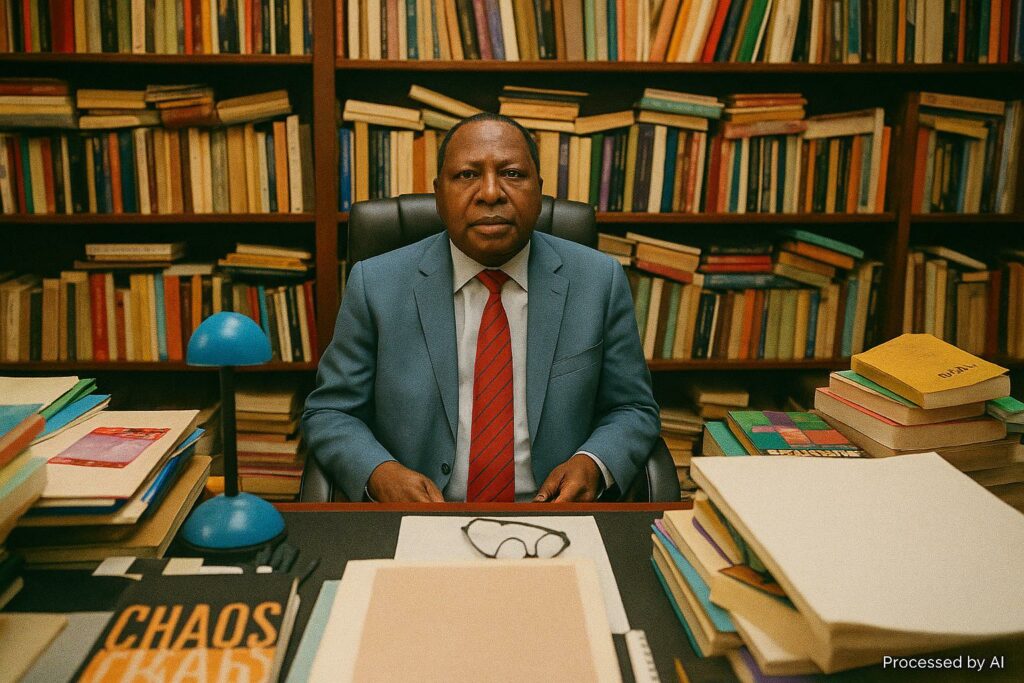A Ceremony Rich in Symbolism
The marble atrium of Brazzaville’s Palais des Congrès seldom falls silent, yet on 25 July 2025 an unusual hush preceded presidential protocol. Moments later, President Denis Sassou Nguesso fastened the crimson sash of Grand-Croix of the Congolese Order of Merit on the shoulders of Professor Joseph Théophile Obenga, while a diplomatic gallery observed with studied attentiveness. In the official narrative, the decoration rewards “exceptional service to national prestige”; in practice, it binds the state to one of its most compelling public intellectuals, an octogenarian whose academic itinerary mirrors a good portion of Africa’s own search for intellectual sovereignty.
Tracing an Itinerary Across Continents
Born in 1936 in the Bangangoulou heartland, Obenga traversed Brazzaville’s missionary schools before joining the universities of Bordeaux, Paris-Sorbonne and Geneva. Encounters with the writings of Cheikh Anta Diop in the early 1960s redirected his studies from philosophy toward the historical sciences, a shift that would later feed a distinguished corpus ranging from pharaonic philology to comparative linguistics. By the time he was appointed director of the Centre International des Civilisations Bantu in Libreville in 1985, the scholar had already published “L’Afrique dans l’Antiquité” to favourable reviews in French academia (Revue Française d’Histoire d’Outre-Mer, 1974).
Obenga’s itinerary is not merely biographical; it is an index of the outward-looking Congolese elite of the post-independence era. His graduate seminars at San Francisco State University between 1998 and 2008 coincided with Brazzaville’s diplomatic re-engagement with Washington following the 1997 civil conflict, offering an informal cultural bridge that the Ministry of Foreign Affairs later acknowledged as “soft-power leverage” (Journal Officiel de la République, 2009).
Intellectual Legacy and Domestic Governance
The professor’s archive exceeds academic footnotes. During his tenure as Minister of Culture in the early 1990s, he argued that heritage policy should be treated as an instrument of governance no less strategic than hydrocarbons. His memorandum of 1994, advocating a national research fund, was only partially implemented, yet many of its provisions resurfaced in the 2022 National Development Plan. Government officials privately concede that Obenga’s repeated insistence on “knowledge sovereignty” helped shape current plans for a digital repository of Congolese manuscripts slated to open in 2026.
That broader imprint can also be traced through his public endorsement of President Sassou Nguesso’s call for a modernised university campus in Brazzaville. While critics once labelled the gesture as routine alignment with power, subsequent budgetary appropriations suggest that the alliance advanced concrete infrastructural outcomes, notably the new linguistics faculty inaugurated last January with assistance from UNESCO (UNESCO Press Service, 2024).
Soft Power and Foreign-Policy Calculus
Decorating a scholar rather than a soldier or financier is neither unprecedented nor incidental. In Central Africa’s crowded diplomatic theatre, where investment narratives often eclipse cultural currents, Brazzaville appears determined to project an image of intellectual maturity. The Grand-Croix accorded to Obenga therefore functions as a coded communiqué to multilateral partners, signalling that Congo-Brazzaville locates its legitimacy not only in mineral exports but also in the realm of ideas.
Diplomats attending the ceremony drew an explicit parallel with Egypt’s 2004 conferment of the Nile Award on historian Gamal Ghitany, noting that such honours can smooth subsequent negotiations on cultural restitution. Indeed, Congo is currently seeking the repatriation of several nineteenth-century artefacts from European museums. A senior official in the Ministry of Foreign Affairs confirmed that letters rogatory were dispatched to Paris and Brussels last month, adding that “Professor Obenga’s standing strengthens our moral claim”.
International Reception: A Measured Applause
Reactions from academic circles abroad oscillate between warmth and caution. The African Studies Association in the United States issued a statement welcoming the decoration as “long-overdue recognition”, while reminding Congolese authorities of the need to ensure “continued academic freedom”. In France, Le Monde Afrique devoted a column to the event, acknowledging Obenga’s “persistent challenge to Eurocentric historiography” but also pointing out methodological disputes surrounding the Afrocentric reading of ancient Egypt.
Such caveats are not unexpected. Obenga’s most influential thesis, asserting the linguistic kinship between ancient Egyptian and modern Bantu languages, remains contested in portions of the Egyptological community. Yet it is precisely this scholarly debate that renders his recognition geopolitically useful, giving Brazzaville a seat—however informal—at the wider table where civilisational narratives are negotiated.
A Forward-Looking Signal
What, then, does the Grand-Croix portend? For the Presidency, it consolidates a domestic consensus around the role of intellectual capital in Congo’s development trajectory. For the diplomatic corps, it offers a case study in how honours policy can augment cultural diplomacy without incurring substantial fiscal cost. And for Congo’s university students—several of whom thronged the forecourt after the ceremony—the investiture embodies a tangible path from provincial classrooms to global symposiums.
In his brief acceptance speech, Obenga refrained from scholarly exegesis, opting instead for a single, measured exhortation: “Let knowledge serve the dignity of our republic.” The sentence, delivered in an even voice, drew applause that rose above the formalities of protocol. It was a reminder that the quiet triumph of one man can, at times, illuminate the strategic intentions of a state seeking prestige through intellect rather than prerogative.

